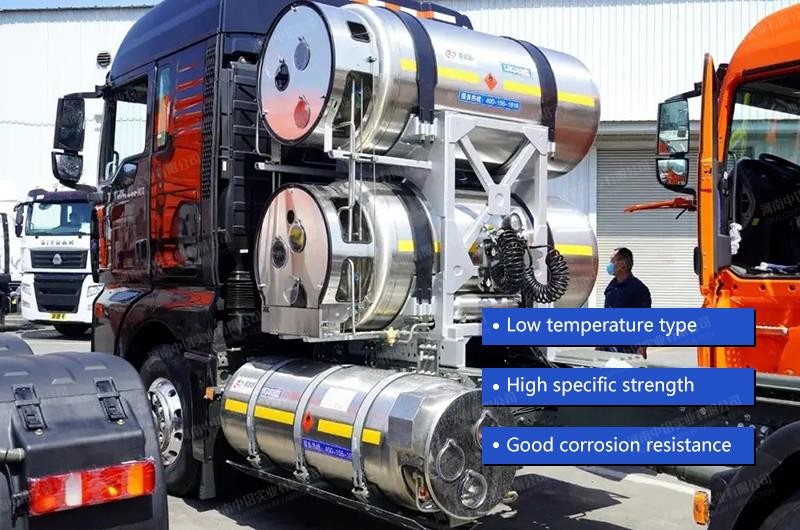
86 17344894490
service@chalcoaluminum.com
- Aluminum Forgings for Rail Vehicles
- Aluminum plate sheet for rail Rail vehicles
- Aluminum Profile for Rail Vehicles
Aluminum Alloys in Vehicle-mounted LNG Cylinders
Natural gas now accounts for one third of the world's total energy production, and it is possible to gradually squeeze the popular oil and coal into a secondary position in the near future. As a market segment product, the consumption of liquefied natural gas is increasing at a rate of 10% per year. The global demand for liquefied natural gas will increase from 218 million tons in 2010 to 310 million tons in 2015 and 410 million tons in 2020. As a clean energy for sustainable development, LNG has obvious environmental and social benefits. After replacing fuel oil with LNG, it can reduce sulfur dioxide emission by 90% and nitrogen oxide emission by 80%. The environmental benefits are very obvious. It is a high-quality alternative fuel for vehicles. In today's increasingly tense world energy and extremely serious air pollution, vigorously promoting clean energy in the field of transportation, especially in heavy trucks, reducing oil consumption and emission pollution will be the trend of development in the future. In the global environment of energy conservation and emission reduction, lightweight has become the dominant development direction of vehicles. Due to the limitation of on-board LNG cylinders, LNG vehicles have a large self weight, which has certain constraints on the development direction of vehicles pursuing lightweight.

Aluminum Alloys in Vehicle-mounted LNG Cylinders
In recent years, the design and manufacturing level of non-ferrous metal pressure vessels in China has been continuously improved, but the main materials of domestic pressure vessels are still traditional steel materials, resulting in large energy consumption and weight, which not only consumes more resources, but also reduces the economy and competitiveness of vessels. Aluminum alloy is widely used in pressure vessels because of its unique physical properties, low density (about 1 / 3 of iron) and good low-temperature mechanical properties, which provides a certain foundation for on-board LNG cylinders and a new direction for cylinder lightweight
1 Characteristics of aluminum alloy materials
Compared with the steel commonly used in pressure vessels, aluminum alloy can be used in pressure vessels, which mainly has the following characteristics:
- (1) Corrosion resistance. Corrosion resistance is one of the most important uses of non-ferrous metal pressure vessels. Due to the different chemical properties of aluminum alloys, the range and degree of corrosion resistance media are also different.
- (2) Heat transfer. The thermal conductivity of aluminum alloy is several times that of steel. In terms of thermal conductivity, aluminum alloy is an excellent thermal conductivity material second only to copper.
- (3) High specific strength. Among the commonly used structural materials, the density of aluminum is small, and its specific strength (the ratio of tensile strength to density) is higher than that of steel. For mobile pressure vessels, higher specific strength of materials means lighter equipment weight, which can reduce energy consumption and cost during transportation.
- (4) Low temperature resistance. The crystal structure of aluminum alloy is face centered cubic structure. Because the coordination ability of all aspects of face centered cubic crystal structure is particularly good, brittle fracture will not occur when the aluminum alloy pressure vessel is used under the condition of low temperature. Not only that, the light and humanity of aluminum alloy will not be reduced, but it will have good mechanical properties. The low temperature resistance of aluminum alloy can be up to - 269 ℃, without any additional requirements.
Alloy:5083 5086 5754 5454
Temper: O, H32, H22,
Thickness: 5--8mm
Width: 2000mm
Length:6000mm
Advantages of aluminum alloy in gas cylinder application
- (1) Low temperature resistant. The on-board LNG cylinder is a low-temperature container, and its design temperature is generally - 196 ℃. Under this temperature, ordinary materials will produce low-temperature brittleness; The aluminum alloy can be used under the condition of very low temperature, and its low-temperature resistance can be up to - 269 ℃. Even under the condition of low temperature, the tensile strength and yield strength of the aluminum alloy will be improved, and the fracture toughness will be improved to meet the design requirements of the temperature of the on-board LNG cylinder.
- (2) High specific strength. The specific strength is the strength of the material (the force per unit area when disconnected) divided by its density. Also known as strength weight ratio, the higher the specific strength, the lighter the material used to achieve the corresponding strength. Most of the existing on-board LNG cylinders are made of stainless steel with high density. Due to material limitations, the self weight of the cylinder is heavy. The specific strength of aluminum alloy is high. The on-board LNG cylinder is a mobile pressure vessel. The higher specific strength brings lower self weight, so that the on-board LNG cylinder can reduce energy consumption and cost in the process of use.
- (3) Good corrosion resistance. The operation environment of on-board LNG cylinders is mostly open-air environment, which needs to have good corrosion resistance to the atmospheric environment. During the use of aluminum alloy, due to the oxidation reaction between aluminum alloy and oxygen in the air, a dense oxide film is formed on its outer surface, and its adsorption capacity is strong enough to make aluminum alloy have strong atmospheric corrosion resistance.
As the core equipment of LNG vehicle fuel system, vehicle mounted LNG cylinder has become its main development direction under the environment of energy conservation and emission reduction. Although there are many problems in the application of aluminum alloy in vehicle mounted LNG cylinder, it has unique advantages in some aspects, especially in the direction of lightweight, and has great potential. Strengthening the development and application of aluminum alloy for on-board LNG cylinders is of great significance to the lightweight of LNG cylinders and vehicles.

Free offer of products, welcome to consult at any time, we will give the first reply.Our Email:
